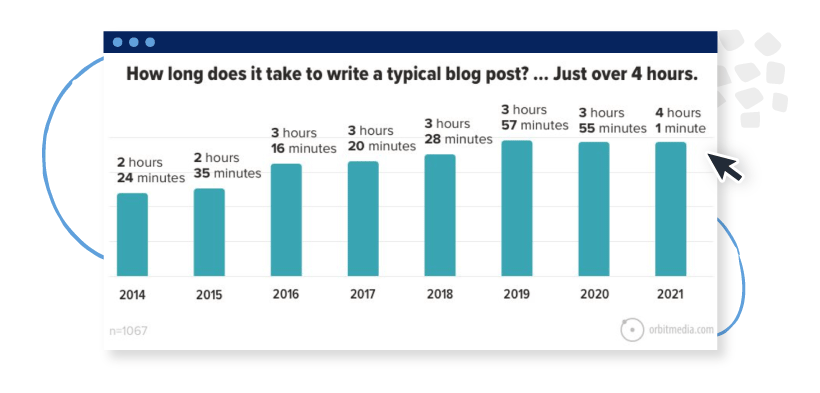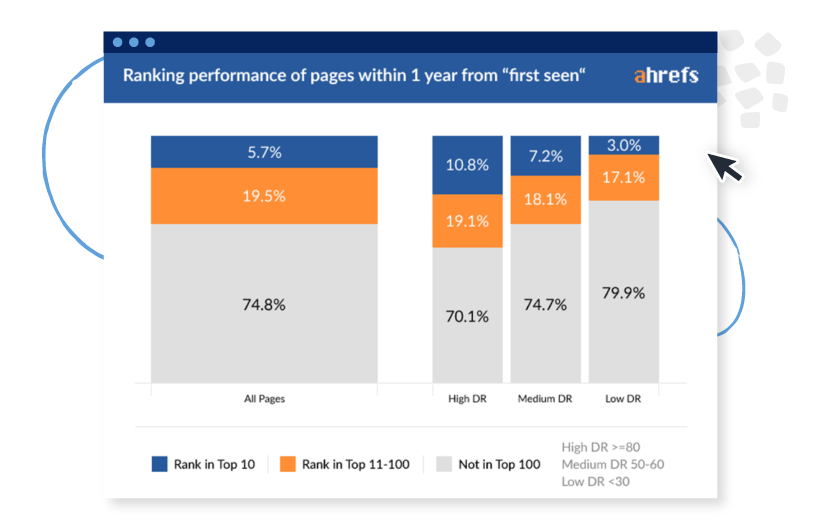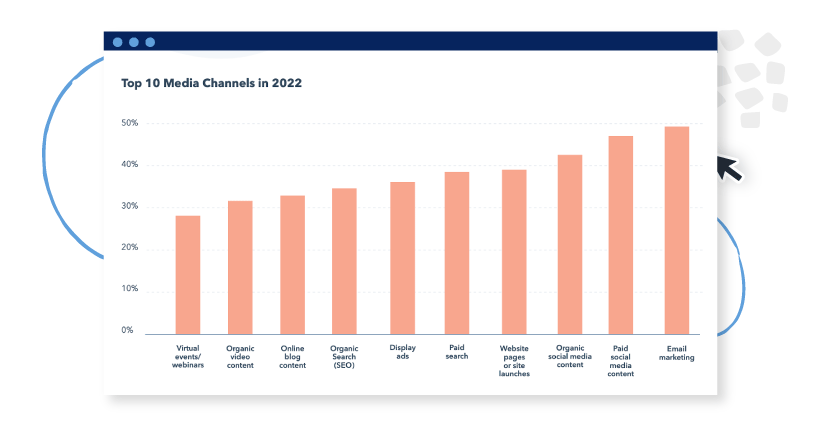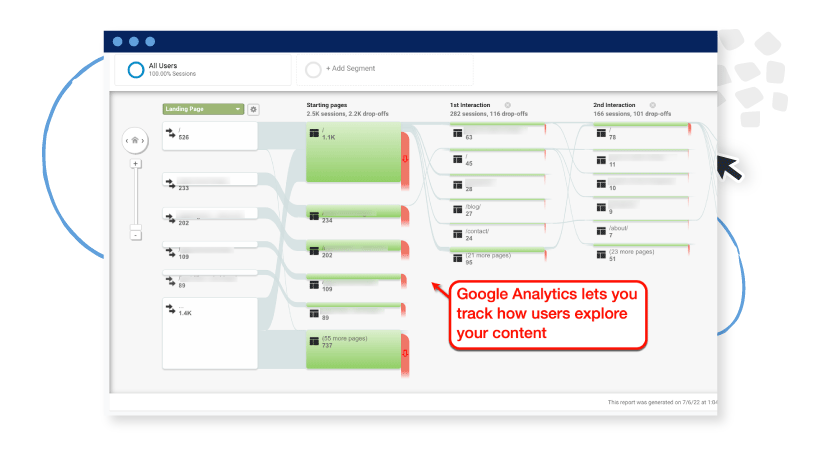“Why does content marketing take time to produce meaningful results?”
That’s a question business owners often ask.
High-performing content marketing campaigns take a ton of effort so it’s no surprise why people are keen on finding that out.
We’ve put together this comprehensive guide to help you better understand the inner workings of content marketing and why it takes time to produce substantial results.

What content marketing is not
Most business owners don’t see the results they are looking for from content marketing because they have several misconceptions about it. To avoid false assumptions about how content marketing works, you first need to know what it’s not.
Content marketing is not an outbound strategy
Content marketing is an inbound marketing strategy. That means it helps bring people to your site and product offering.
It’s not an intrusive strategy where you force your content in front of your audience even though they aren’t looking for it.
While content marketing strategies overlap with other types of marketing, namely email and social media marketing, it prioritizes organic traffic.
Content marketing is not a one-off project
Content marketing is not a set-it-and-forget strategy.
Forget the adage “build it and they will come.” This very rarely happens online, where millions of blog posts are published daily.
With how noisy the internet has become, your content and products will go unnoticed unless you endeavor to promote them.
To get great results out of your content marketing strategy, it needs to be maintained, analyzed, and optimized over time.
Content marketing doesn’t get results overnight
Unless you’re already an established brand with millions of followers and existing traffic, content marketing will take time to generate substantial results.
Certain content promotion strategies, like sharing on social media and guest blogging, get quick wins. But the real, sustainable value of content marketing takes months to achieve.
Content marketing is not advertising
Your content shouldn’t only talk about your brand. It should focus primarily on topics that matter to your target audience.
Unlike advertising where you openly promote your product or service, content marketing aims to educate and provide value to the readers, which then primes them to take action on your offers.

Why content marketing takes time
Here are four reasons why content marketing takes time to get you the results you’re looking for:
1. Content marketing has multiple goals
Content marketing has four key goals: attract a target audience, help solve their problems, build authority, and drive action.
These goals demand a considerable amount of time to accomplish.
You need to conduct audience research and competitor analysis, develop a content strategy, and then create the actual content. Statistics show that content creators take a little over four hours to write a blog post.

Image Source: OrbitMedia.com
Once your post goes live, you must perform other time-consuming tasks to reap the full benefits of your content. This includes content promotions, analytics, and ongoing optimization.
2. It takes 2-6 months to reach Google’s first page (if you’re lucky)
Search engines don’t index newly-published posts right away.
First, search engine crawlers need to explore your website and discover URLs to new pages. According to Google, this process can take a few days to a few weeks.
Getting indexed is just the beginning.
To maximize your content’s traffic potential, you must displace every page that ranks above it—all the way to Google’s first page. This takes several months of grueling link building and on-page optimization.
An Ahrefs study revealed that it takes two to six months for content to reach Google’s first page.

Image Source: Ahrefs.com
Out of all the pages published online, only 5.7% reach Google’s first page within a year. And if your team is not prepared to think 12 months ahead then your content efforts could go to waste.
3. You need to have a really good content marketing strategy
Successful content marketing strategies often require several pieces of carefully researched and optimized content.
Using SEO pillar pages and topic clusters is the perfect example.
To get high rankings, create pillar pages for your main topics. These are long-form, comprehensive articles that mention all the subtopics you can identify.
You also have to create in-depth content that focuses on individual subtopics. Link them all together, and you have a “topic cluster”—a key ingredient of optimized site architecture.
That’s just one example of elaborate content marketing strategies that take months to execute.
Below are a few more:
- Ecommerce Content Framework: Create product pages and organize them into categories.
- Evergreen Content Forest: Build truckloads of content with evergreen value (in-depth guides, influencer content, tool roundups, etc.).
- Spaghetti Blogging Framework: Blog about relevant topics in your niche and see what sticks.
- Tofu-Mofu-Bofu: Create content optimized for the top, middle, and bottom of your marketing funnel to generate conversions.
4. Leads need time to warm up to your brand
Most people who come to your website don’t convert on their first visit.
They need time to get to know your brand, research your products, and assess alternatives before they feel comfortable parting with their money.
That’s why content marketing needs an ongoing strategy.
Keep them occupied with regular fresh content to build trust. Meanwhile, sprinkle your content with just enough CTAs (calls-to-action) to subscribe to your newsletter, make an inquiry, or buy something.

How long does content marketing take?
Multiple studies state that content marketing may take between six to twelve months to get significant results. Some sources claim it takes about two years, especially if you need to reach Google’s first page.
It’s impossible to figure out how much time your content marketing campaign needs since several variables are involved, such as competition, marketing budget, industry size, etc.
Consider using the tips below to speed up your chances of getting meaningful content marketing results.
- Consistent content production: Consistently invest in content creation to achieve your content marketing goals faster. Publishing content regularly can boost your SEO, improve lead generation, and grow your online presence.
- Competitor research: Analyze competitors to learn the content ideas, types, and promotion strategies that work for them. This saves you countless hours on content research while increasing your chances of getting great returns from your content marketing initiatives.
- Relentless content promotion: Promote content on all channels relevant to your target audience. Re-share your content after some time, but only after sharing a reasonable amount of other posts.
- Professional content marketing services: Use content marketing services that help with content planning, creation, promotion, optimization, and everything in between.
- Content curation and syndication: Share content from other authoritative sources (content curation) to quickly get your target audience’s attention. In the meantime, re-publish your content on other platforms (content syndication) to maximize its reach.
As a general rule, it pays to ensure you consistently follow content marketing best practices, such as checking for content gaps and conducting content upgrades. If you’re already doing that, then you just need to trust the process.

How to maximize content marketing long-term
Winning at content marketing is a big commitment.
You either give up before your campaign gets off the ground or be in it for the long haul.
If you want to win at content marketing, here’s a quick content checklist that can help:
1. Provide evergreen value
You need to produce tons of evergreen content to use content marketing for long-term SEO growth.
These are pieces of content with long-term value. Unlike seasonal and trendy topics, they focus on topics that don’t run out of demand.
You should also regularly check and update your content when necessary.
This prevents competitors from stealing your backlinks and overtaking you in search engine results.
Competitors do this by finding outdated data or facts from your content. To steal links, they’ll reach out to your backlink source, show content with updated information, and ask to replace your link with theirs.
2. Diversify your content marketing
Diversify your content marketing portfolio by incorporating various content types. Use images, videos, eBooks, white papers, infographics, and podcasts to penetrate various platforms like Facebook, Instagram, YouTube, and Spotify.
Also, mix up the topics you cover in your content to keep your audience engaged. Experiment with expert roundups, interviews, customer success stories, and storytelling to create a formula that works for you.
3. Supplement content marketing with email
Leverage email marketing tools to send your audience newsletters and blog post updates. This lets you bring high-quality traffic to your content and accelerate marketing results.
Research shows that email marketing is the biggest media channel in 2022.

Image Source: HubSpot.com
Some of the best email marketing platforms you can try are:
- Mailchimp
- Keap
- HubSpot
- Sendinblue
- GetResponse
4. Set realistic goals
Use what you’ve learned thus far to adjust your content marketing goals.
Finetune your projections, update your timeline, and redefine what “success” means for your content marketing campaign.
Set goals like the ones below.
- Reach Google’s first page in six months
- Generate 5,000 monthly recurring traffic
- Increase revenue by 50% through unpaid media
Specific goals allow you to develop an actionable roadmap. More importantly, they help you identify Key Performance Indicators (KPIs) for measuring results.
5. Use analytics tools
Set up website analytics tools like Google Analytics to have a top-level view of your content performance.
Google Analytics is a free platform that tracks metrics like your bounce rate, page views, and conversions. It also tracks your top pages and how users navigate through them.

Image Source: Analytics.Google.com
Analyzing your content’s performance sheds light on your audience’s content preferences—which topics they care about and what content types they want. Use this knowledge to optimize your content strategy moving forward.
FAQs about content marketing
1. What is content marketing?
Content marketing is a type of digital marketing that involves the creation and promotion of content to get inbound traffic. Content types include blog posts, videos, infographics, social media posts, and podcasts.
2. What are examples of content marketing?
Content marketing can be a series of blog posts that explore a main topic, an eBook promotion, or a planned webinar. The goal of these campaigns is to educate the audience, build brand authority, and drive engagement.
3. How to create a content marketing strategy?
Seven steps to create a content marketing strategy:
- Set your content marketing goals
- Conduct audience research
- Define your Key Performance Indicators (KPIs)
- Research content topics and keywords
- Create content
- Promote it on relevant content distribution channels
- Track and optimize content performance

Develop high-performing content marketing campaigns
Content marketing is a marathon—not a sprint.
If you want to speed things up, look for content marketing services and tools that give you a competitive edge.
ClearVoice offers fully-managed content development services that thousands of businesses use to accelerate content marketing results.
To succeed at content marketing, choose the right partner and build a robust toolbox.



